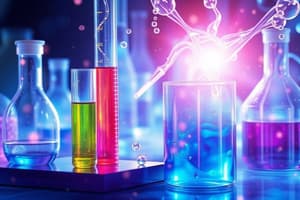Podcast
Questions and Answers
What is the primary application of Gas Chromatography in pharmacognosy?
What is the primary application of Gas Chromatography in pharmacognosy?
- Determination of molecular weight
- Purification of plant extracts
- Analysis of volatile compounds (correct)
- Identification of proteins
Which type of chromatography is commonly used for the separation of bioactive compounds from plant extracts?
Which type of chromatography is commonly used for the separation of bioactive compounds from plant extracts?
- Thin Layer Chromatography (correct)
- Gas Chromatography
- Liquid Chromatography
- Size Exclusion Chromatography
What is the main advantage of High-Performance Liquid Chromatography (HPLC) in pharmacognosy?
What is the main advantage of High-Performance Liquid Chromatography (HPLC) in pharmacognosy?
- Ability to handle large sample volumes
- High specificity (correct)
- High sensitivity
- High speed of analysis
Which type of chromatography is used for the purification of biomolecules based on their size and shape?
Which type of chromatography is used for the purification of biomolecules based on their size and shape?
What is the primary application of Affinity Chromatography in pharmacognosy?
What is the primary application of Affinity Chromatography in pharmacognosy?
Flashcards are hidden until you start studying
Study Notes
Chromatography Applications in Pharmacognosy
- Gas Chromatography is primarily used for the analysis of volatile compounds and essential oils in pharmacognosy.
Separation of Bioactive Compounds
- Normal Phase Chromatography is commonly used for the separation of bioactive compounds from plant extracts.
High-Performance Liquid Chromatography (HPLC)
- The main advantage of HPLC in pharmacognosy is its high sensitivity, selectivity, and speed in the analysis of complex mixtures.
Purification of Biomolecules
- Gel Filtration Chromatography is used for the purification of biomolecules based on their size and shape.
Affinity Chromatography
- The primary application of Affinity Chromatography in pharmacognosy is the purification of proteins and other biomolecules based on their biological function or affinity.
Studying That Suits You
Use AI to generate personalized quizzes and flashcards to suit your learning preferences.




